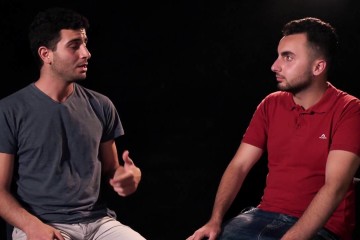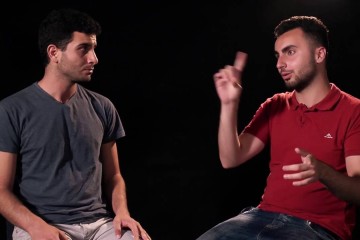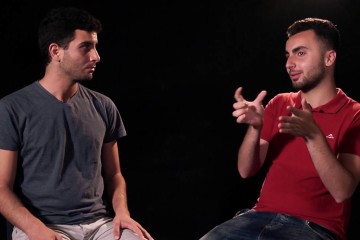The women of Full Frame Media’s One Table discuss what it is like to be a woman in this region. Tiffany Shalem and Faten Zenaty describe their experiences growing up in Jewish and Muslim societies, and their hopes and aspirations for women (and men) within their communities.
Transcription:
I want to talk about when you first met the gender thing I was, I think, four or five years old and we went to the play garden, I went with my aunt and I saw all the boys playing, and it was very hot outside, it was August and they all had their shirts off I was like five, four, in kindergarten and I was like, “Ok, I want to take my shirt off too.” I mean, everyone is having fun in the sand. And then my aunt told me, “No, you can’t take off your shirt” and I said, “Why?” “Because you’re a girl” And I was like, OK that’s the first time I understood that I’m a girl But its OK, its OK to be a girl I mean it’s not OK, its perfect. It’s amazing. And the thing is How it is to be a woman… I don’t feel different. I don’t feel I don’t have an opportunity to do something I was raised by a single mother And she always told me, “You can do whatever you want to do.” Because she was the mother and the father. So I always knew I can do whatever I want. And I married an amazing man who lets me – what lets me? he pushes me to do the best I can and he’s now taking care of the baby. while I’m here. And I’m going to teach my son to be the same man that believes in women and understands them and he’s equal to them. I think it’s an important point that you raise because we as women have that duty to our children to teach them to be accepting, to be tolerant, to allow individuals to become everything they can be I think that is a huge responsibility that lies with us, not only responsibility but opportunity. Never mind going the political route let’s go the personal route and say that we as women, as educators, as nurturers should try and bring up our children to accept who they are, no matter what they are and to encourage them to reach as high as they want to regardless of gender exactly, and to be respectful. You as mothers can actually raise good men. like nice men. I really hope so. I think to be a woman and a mother and an Arab woman a traditional Muslim woman in Israel is a big, big conflict, from a lot of issues. I don’t ever have a problem with the genders. Why as a woman I cannot do and my brother can do and my brother can do. When I started to feel that I want something to change in my community to be, I don’t want to be a leader but to do something that nobody else can do I know that I need some man with me. But who is the man that can? It was my father. Because if you don’t have in your life someone who believes in you and pushes you up it cannot be. And my father was the first man to whom I said that I want to do something else. In our family we are four children, four girls and four boys. I am the eldest of the girls. All the time my father would say “These are my children, and this is the big one.” Always. I grew up in this home. And when I come to my husband I come with a power And nobody can say “No” to me after that Because I know that I have power within myself. But not power just for the community. For my father. And now when I work with men, and I work with men all the time, I feel that I am stronger I can look them in the eyes And I’m not afraid. But all the time I also know where the respect for the male leaders lies within my community. When the Sheikh or the Priest come to my table, I come and ask them what they want to drink. I don’t feel that I am small or a woman, I feel it is respect for the leadership of our community and it gives me honor. it gives me more respect. The conflict between men and women I don’t feel it in other areas of my life but I want for the Arab women the Palestinian Arab women to do something else with herself. In a country that does not see in her as Arabs, equality. This is the issue in my system.




